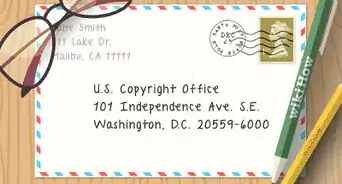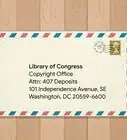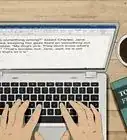This article was co-authored by Srabone Monir, JD. Srabone Monir, Esq., is an Attorney based in New York. She received her JD from the St. John's University School of Law in 2013, and has used her legal training in positions for 32BJ SEIU, the New York Legal Assistance Group, and Disability Rights New York. She is currently a Principal Law Clerk with the New York State Supreme Court. She is also a VA Accredited Attorney as of 2015 and is licensed to practice law in New Jersey and in New York.
There are 7 references cited in this article, which can be found at the bottom of the page.
wikiHow marks an article as reader-approved once it receives enough positive feedback. In this case, 93% of readers who voted found the article helpful, earning it our reader-approved status.
This article has been viewed 575,827 times.
When you've created something original, such as a book, you want to ensure that your work—whether published or unpublished[1] —is protected. Contrary to popular belief, sending yourself a copy of your work through certified mail is not an adequate means of obtaining copyright. Copyrighting your work through common law is a way of proving that the work is your own, but official registration is necessary before you have any power to take action against someone who is stealing or profiting from your work.
Steps
Securing Common Law Copyright
-
1Know the law for your location. If your country is a signatory to the Berne Convention for the Protection of Literary and Artistic Works—and that covers most countries in the world—then your work is protected from the moment you create it in a format that is "perceptible either directly or with the aid of a machine or device."[2]
- That means that you automatically own the copyright to any original work you create—as long as you commit it to readable form.
- For the current list of countries that are signatories to the Berne Convention, visit the World Intellectual Property Organization (WIPO) at http://www.wipo.int/members/en/
- WIPO does not offer a registration service for copyright, but it does acknowledge that many countries have national registration systems in place and that for some countries, this serves as prima facie evidence in a court of law as to copyright ownership.
-
2Fix the date of your copyright. This will protect you should there be a legal ownership dispute in the future. There are several informal ways to solidify your claim without pursuing official registration, though there is no provision in copyright law regarding these methods:
- Publish your work to gain common law copyright protection. Whether you publish on a blog, a newspaper, a magazine, or in book form, this is another method to establish you as the original author.
- Be sure that when published, the work contains your full name and the date of publication.
- Note that if you are a US citizen, you will need to officially register with the US Copyright Office before you are able to make a claim in a US court (even if you already own a right on your work). Registration may also entitle you to statutory damages in a US legal system.
Advertisement -
3Use the copyright symbol. According to applicable law in most countries, you own the copyright in the work as soon as it is fixed in a readable format. By placing the copyright symbol (©) on your work, you are telling others that you know your rights, and give a legally-relevant date of original publication.
- You might also consider adding reference to the legislation that backs up your copyright claim, such as: "© 2013, [your name]. Except as provided by the Copyright Act [date, etc.] no part of this publication may be reproduced, stored in a retrieval system or transmitted in any form or by any means without the prior written permission of the publisher."[3] The appropriate wording is not set in stone and is often defined by your publisher's preference, or by jurisdictional tradition, so ask your publisher or attorney for advice.
- If you are considering publishing in various countries, it is a good idea to ask your publisher's legal team or your own attorney about the value of registering in all countries where your works will be published.
Getting Official Registration
-
1Know your own country's copyright legislation. Registering your copyright in your own country is generally a straightforward process, and it can usually be done online. In some countries (such as the United States), an officially registered copyright is required before you can pursue a court case against someone who has infringed on your copyrighted material.
-
2Register in the United States of America with the US Copyright office. Responsibility for the administrative aspects of copyright law rests with the United States Copyright Office, whose website can be found here. You can also register your work online (for a reduced fee) by creating an account and logging into the Electronic Copyright Office (eCO) here.
-
3
-
4Consult the Intellectual Property Office in the United Kingdom. British copyright law can be found in The Copyright Act 1956, The Copyright, Designs and Patents Act 1988, Copyright and Related Rights Regulations 2003, and relevant case law interpretations. Further information about copyright in the UK can be found at the Intellectual Property Office. There is no official registration system in place for copyrighting works. It is considered an "automatic right."[5]
- You can send a copy of any published work to the British Library within one month of publication so that they can include it as part of their records of all published works. Find out more about the British Library and copyright here.
-
5Consult the Copyright Council in Australia. Australian copyright law can be found in the Copyright Act 1968,[6] along with various court decisions that have interpreted copyright over the years. The Australian Copyright Council is a good resource.
- Like in the UK, copyright in Australia is automatic. There is no system in place for "official" registration. You can, however, send a copy of your book to the National Library of Australia.[7] Check State legislation as well, as you may need to make a legal deposit to a relevant State library.
-
6Check with the Copyright Council for copyright in New Zealand. New Zealand copyright law can be found in the Copyright Act 1994,[8] and good copyright information can be found from the Copyright Council of New Zealand. According to the Copyright Council, no registration is necessary, or even possible, nor is any other formality required for securing copyright protection.
- You can send a copy of every new published work to the National Library of New Zealand. To function as a "legal deposit," should you need formal proof of the date of your copyright.
Warnings
- This article aims to provide a basic understanding of copyright law. If you have serious interests to protect, you are advised to contact an Intellectual Property lawyer who will tell you what to do in your particular situation.⧼thumbs_response⧽
- Titles cannot be copyrighted.⧼thumbs_response⧽
- Registration deposits are normally non-returnable.⧼thumbs_response⧽
- Copyright does not protect ideas. It only protects works, so you need to write your ideas into a tangible form!⧼thumbs_response⧽
References
- ↑ http://www.copyright.gov/help/faq/faq-general.html#mywork
- ↑ http://www.copyright.gov/help/faq/faq-general.html#mywork
- ↑ https://www.copyright.org.au/ACC/Find_an_Answer/ACC/Public_Content/Find_an_Answer.aspx
- ↑ http://laws-lois.justice.gc.ca/eng/acts/C-42/
- ↑ http://www.ipo.gov.uk/types/copy/c-about/c-auto.htm
- ↑ http://www.austlii.edu.au/au/legis/cth/consol_act/ca1968133/
- ↑ http://www.nla.gov.au/services/ldeposit.html
- ↑ http://www.legislation.govt.nz/act/public/1994/0143/latest/DLM345634.html?search=ts_act_copyright+act_resel&sr=1
About This Article
To copyright a book, publish it online or in book form with your full name and the date of publication. Additionally, use the copyright symbol when you publish your book. However, these steps only give you common-law copyright protection. To protect your book in a United States court of law, you need to get official registration by going online to the U.S. Copyright Office and applying for a copyright for your book. For information from our Legal reviewer on copyrighting a book in Canada, the United Kingdom, Australia, or New Zealand, read on!


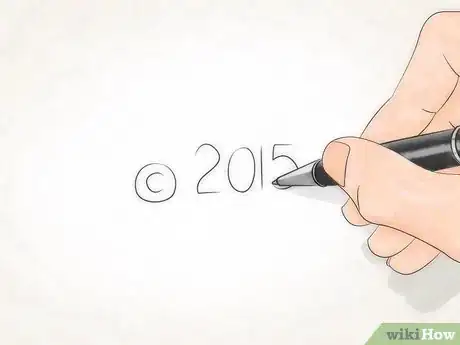
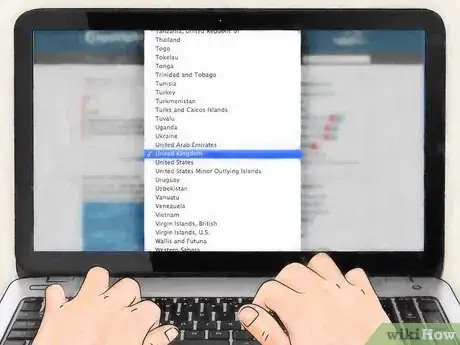
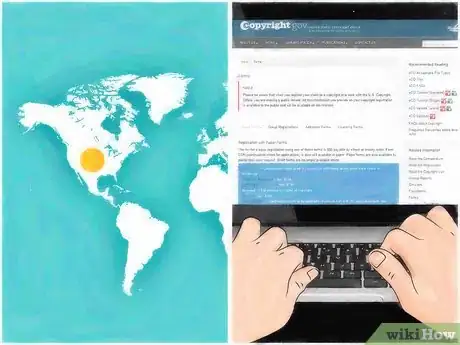





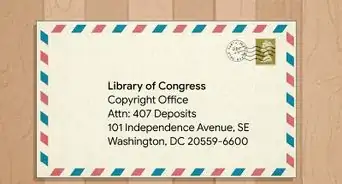

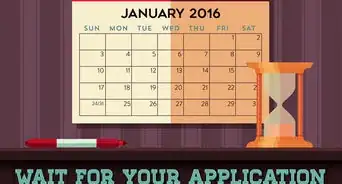

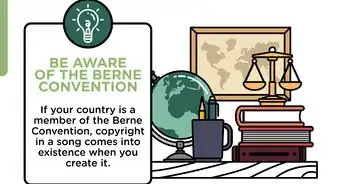


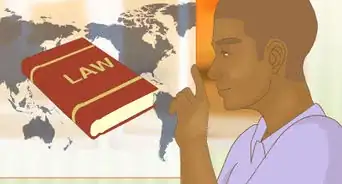

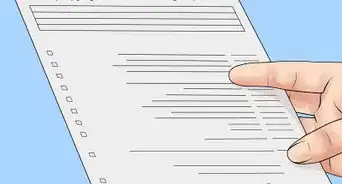

-Step-13.webp)
